
Alexander William Doniphan (1808-1887)--Missouri attorney, military figure, politician, and businessman--is one of the most significant figures in antebellum Missouri. From the 1830s to the 1880s, Doniphan was active in a variety of affairs in Missouri and held firm to several underlying principles, including loyalty, hard work, the sanctity of the republic, and commitment to Christian charity. However, the key to Doniphan's importance was his persistent moderation on the critical issues of his day.
Doniphan became a household name when he served as the commanding officer of the famed First Missouri Mounted Volunteers during the Mexican-American War. It was during this time that he won two battles, established an Anglo-American-based democracy in New Mexico, and paved the way for the annexation of the territory that became New Mexico and Arizona. He is also recognized by the Mormons for his assistance to their beleaguered church during Missouri's "Mormon War" and for his refusal to execute Joseph Smith when ordered to do so by his commanding officer.
Although Doniphan was a slaveholding unionist, he sought a middle ground to stave off war in the 1850s and early 1860s and served as a delegate to the Washington Peace Conference in 1861. When conflict escalated along the western border of Missouri in 1862, Doniphan moved to St. Louis, where he worked as a lawyer with the Missouri Claims Commission, seeking pensions for refugees.
Doniphan early adopted the Whig ideal of the "positive liberal state" and sought to use the power of government to remake society into something better. Once he saw the heavy-handed use of state power during Reconstruction, however, Doniphan reversed his views on the role of the government in society. For the rest of his life, he resisted government incursions into the lives of the people and sought to restore a healthy Union.
Alexander William Doniphan will be of interest to academic specialists and general readers alike, especially those interested in Mormon studies, Missouri history, military history, and Western history.
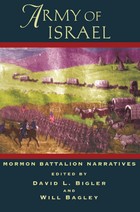
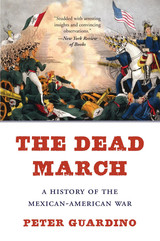
Winner of the Bolton-Johnson Prize
Winner of the Utley Prize
Winner of the Distinguished Book Award, Society for Military History
“The Dead March incorporates the work of Mexican historians…in a story that involves far more than military strategy, diplomatic maneuvering, and American political intrigue…Studded with arresting insights and convincing observations.”
—James Oakes, New York Review of Books
“Superb…A remarkable achievement, by far the best general account of the war now available. It is critical, insightful, and rooted in a wealth of archival sources; it brings far more of the Mexican experience than any other work…and it clearly demonstrates the social and cultural dynamics that shaped Mexican and American politics and military force.”
—Journal of American History
It has long been held that the United States emerged victorious from the Mexican–American War because its democratic system was more stable and its citizens more loyal. But this award-winning history shows that Americans dramatically underestimated the strength of Mexican patriotism and failed to see how bitterly Mexicans resented their claims to national and racial superiority. Their fierce resistance surprised US leaders, who had expected a quick victory with few casualties.
By focusing on how ordinary soldiers and civilians in both countries understood and experienced the conflict, The Dead March offers a clearer picture of the brief, bloody war that redrew the map of North America.
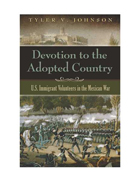

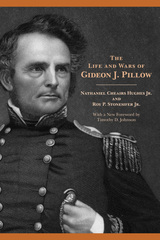
One of nineteenth-century America’s most controversial military figures, Gideon Johnson Pillow gained notoriety early in the Civil War for turning an apparent Confederate victory at Fort Donelson into an ignominious defeat. Dismissed by contemporaries and historians alike as a political general with dangerous aspirations, his famous failures have overshadowed the tremendous energy, rare talent, and great organizational skills that also marked his career. In this exhaustive biography, Nathaniel Cheairs Hughes Jr. and Roy P. Stonesifer Jr. look beyond conventional historical interpretations to provide a full and nuanced portrait of this provocative and maligned man.
While noting his arrogance, ambition, and very public mistakes, Hughes and Stonesifer give Pillow his due as a gifted attorney, first-rate farmer, innovator, and man of considerable political influence. One of Tennessee’s wealthiest planters, Pillow promoted scientific methods to improve the soil, preached crop diversification to reduce the South’s dependence on cotton, and endorsed railroad construction as a means to develop the southern economy. He helped secure the 1844 Democratic nomination for his friend and fellow Tennessean James K. Polk and was rewarded after Polk’s victory with an appointment as brigadier general. While his role in the Mexican War earned him a reputation for recklessness and self-promotion, his organization of what would become the Army of Tennessee put him at the forefront of the Confederate war effort. After the disaster at Donelson, he spent the rest of the war directing Confederate conscription in the West and leading Rebel cavalry forces—a role of continuing service which, the authors show, has been insufficiently acknowledged.
Updated with a new foreword by noted Civil War scholar Timothy D. Johnson, The Life and Wars of Gideon J. Pillow portrays a colorful, enigmatic general who moved just outside the world of greatness he longed to enter.
Nathaniel Cheairs Hughes Jr. is the author or editor of twenty books relating to the American Civil War, including Refugitta of Richmond; Brigadier General Tyree H. Bell, C.S.A.: Forrest’s Fighting Lieutenant; and Yale’s Confederates. The late Roy P. Stonesifer Jr. was a professor of history at Edinboro University of Pennsylvania.
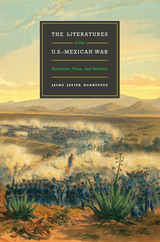
The literary archive of the U.S.-Mexican War (1846–1848) opens to view the conflicts and relationships across one of the most contested borders in the Americas. Most studies of this literature focus on the war's nineteenth-century moment of national expansion. In The Literatures of the U.S.-Mexican War, Jaime Javier Rodríguez brings the discussion forward to our own moment by charting a new path into the legacies of a military conflict embedded in the cultural cores of both nations.
Rodríguez's groundbreaking study moves beyond the terms of Manifest Destiny to ask a fundamental question: How do the war's literary expressions shape contemporary tensions and exchanges among Anglo Americans, Mexicans, and Mexican Americans. By probing the war's traumas, anxieties, and consequences with a fresh attention to narrative, Rodríguez shows us the relevance of the U.S.-Mexican War to our own era of demographic and cultural change. Reading across dime novels, frontline battle accounts, Mexican American writings and a wide range of other popular discourse about the war, Rodríguez reveals how historical awareness itself lies at the center of contemporary cultural fears of a Mexican "invasion," and how the displacements caused by the war set key terms for the ways Mexican Americans in subsequent generations would come to understand their own identities. Further, this is also the first major comparative study that analyzes key Mexican war texts and their impact on Mexico's national identity.
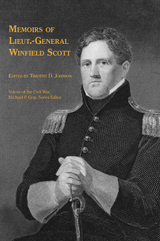
Scott joined the army in 1808, earned the rank of brigadier general in 1814, and was promoted to commanding general in 1841. During the Mexican-American War, he commanded one of the most brilliant military campaigns in American history and mentored the generation of officers who fought the Civil War, including Generals Grant, Lee, Longstreet, Beauregard, Jackson, and Meade. As a young general, he wrote the first comprehensive set of regulations to govern the army and pushed for the professionalization of the U.S. officer corps. Yet, he was ridiculed at the beginning of the war for his prescient prediction that the Civil War would be a prolonged conflict requiring extensive planning and superior strategic thinking.
With this edition, Johnson has merged Scott’s large two-volume memoir into a single, manageable volume without losing any of the original 1864 text. Extensive new annotations update Scott’s outdated notes and provide valuable illumination and context. Covering a wide range of events—from the famous 1804 duel between Aaron Burr and Alexander Hamilton through the end of the Civil War—Scott’s extraordinary account reveals the general as a sometimes
egocentric but always astute witness to the early American republic.
Timothy D. Johnson, professor of history at Lipscomb University in Nashville, is the author of Winfield Scott: The Quest for Military Glory and A Gallant Little Army: The Mexico City Campaign. He is coeditor, with Nathaniel Cheairs Hughes Jr., of A Fighter from Way Back: The Mexican War Diary of Lt. Daniel Harvey Hill and Notes of the Mexican War by J. Jacob Oswandel.
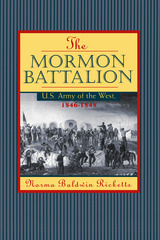
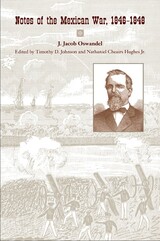
In December 1846, John Jacob Oswandel—or Jake as he was often called—enlisted in the Monroe Guards, which later became Company C of the First Pennsylvania Volunteer Regiment. Thus began a twenty-month journey that led Oswandel from rural Pennsylvania through the American South, onward to the siege of Veracruz, and finally deep into the heart of Mexico. Waging war with Mexico ultimately realized President James K. Polk’s long-term goal of westward expansion all the way to the Pacific Ocean. For General Winfield Scott, the victorious Mexico City campaign would prove his crowning achievement in a fifty-three-year military career, but for Oswandel the “grand adventure of our lives” was about patriotism and honor in a war that turned this twenty-something bowsman into a soldier.
Notes of the Mexican War, 1846–1848, is the quintessential primary source on the Mexican War. From Oswandel’s time of enlistment in Pennsylvania to his discharge in July of 1848, he kept a daily record of events, often with the perception and intuition worthy of a highly ranked officer. In addition to Oswandel’s engaging narrative, Timothy D. Johnson and Nathaniel Cheairs Hughes, Jr. provide an introduction that places Oswandel’s memoir within present-day scholarship. They illuminate the mindset of Oswandel and his comrades, who viewed the war with Mexico in terms of Manifest Destiny and they give insight into Oswandel’s historically common belief in Anglo-Saxon superiority—views that would bring about far worse consequences at the outbreak of the American Civil War a dozen years later.
As historians continue to highlight the controversial actions of the Polk administration and the expansionist impulse that led to the conflict, Notes of the Mexican War, 1846–1848, opens a window into the past when typical young men rallied to a cause they believed was just and ordained. Oswandel provides an eyewitness account of an important chapter in America’s history.
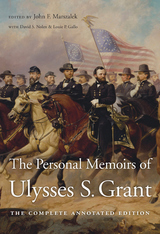
“Leaps straight onto the roster of essential reading for anyone even vaguely interested in Grant and the Civil War.”
—Ron Chernow, author of Grant
“Provides leadership lessons that can be obtained nowhere else… Ulysses Grant in his Memoirs gives us a unique glimpse of someone who found that the habit of reflection could serve as a force multiplier for leadership.”
—Thomas E. Ricks, Foreign Policy
Ulysses S. Grant’s memoirs, sold door-to-door by former Union soldiers, were once as ubiquitous in American households as the Bible. Mark Twain and Henry James hailed them as great literature, and countless presidents credit Grant with influencing their own writing. This is the first comprehensively annotated edition of Grant’s memoirs, clarifying the great military leader’s thoughts on his life and times through the end of the Civil War and offering his invaluable perspective on battlefield decision making. With annotations compiled by the editors of the Ulysses S. Grant Association’s Presidential Library, this definitive edition enriches our understanding of the pre-war years, the war with Mexico, and the Civil War. Grant provides essential insight into how rigorously these events tested America’s democratic institutions and the cohesion of its social order.
“What gives this peculiarly reticent book its power? Above all, authenticity… Grant’s style is strikingly modern in its economy.”
—T. J. Stiles, New York Times
“It’s been said that if you’re going to pick up one memoir of the Civil War, Grant’s is the one to read. Similarly, if you’re going to purchase one of the several annotated editions of his memoirs, this is the collection to own, read, and reread.”
—Library Journal
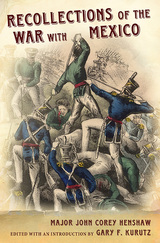
Major John Henshaw, a dutiful regimental officer in the American invasion of Mexico, was one of only a handful of eyewitnesses to describe the two major theaters of that war from start to finish. But unlike most of his peers, he did not see himself as a conquering warrior and took pride in never having taken a life. He even wrote, “If I were alone, no earthly power could induce me to lend a helping hand in this base and infamous war.”
This book presents Henshaw’s recollections for the first time, covering all the action from the first skirmish in southern Texas to the collapse of Mexico City. As a member of the Seventh Infantry Regiment, this pugnacious line officer from New England served under both of the war’s principal generals, Zachary Taylor and Winfield Scott, and survived seven major battles. His writings constitute a virtual “minority opinion” report on the Mexican War.
Henshaw’s recollections include a rare and highly descriptive account of the siege of Fort Texas (later Fort Brown), plus rich new details of the storming of the Bishop’s Palace at Monterrey, the bombardment of Veracruz, the assault on Cerro Gordo, and the savage fighting outside the capital. His records of battles, marches, and maneuvers greatly augment what is already known about the campaign, but in addition to reporting daily occurrences and describing combat in graphic detail, Henshaw also reflected on the strategies and tactics—and what he saw as shortcomings—of officers on both sides.
Bitingly critical of those in command, of American volunteers, and of the war’s glory hounds, Henshaw admired the valor of ordinary soldiers on both sides of the fighting. And in the midst of the carnage, he also found time to describe Mexico’s cities and scenery in rhapsodic prose and express considerable empathy for its people. In addition to the “Recollections,” the volume includes vivid passages from letters Henshaw sent back to his wife, which supply additional details of the campaign. Editor Gary Kurutz provides an extensive biography of Henshaw, as well as comprehensive annotations to the text.
What Henshaw may have lacked as an unquestioning officer he more than made up for as an astute observer. Offering a decidedly different view of this war of American expansion, these writings with their balanced approach lend a fresh perspective among other primary sources and paint a startlingly honest picture of both Americans fighting abroad and those they fought.
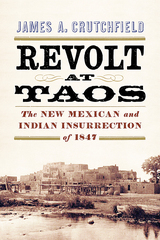
On the morning of January 19, 1847, Charles Bent, the newly appointed governor of the American-claimed territory of New Mexico, was savagely killed at his home in Don Fernando de Taos, a small, remote town located north of Santa Fe. Those responsible for Bent’s murder were New Mexican settlers and Indians from nearby Taos Pueblo who refused to recognize the United States occupation. With emotions rubbed raw, the natives continued their bloodbath until five more leading citizens were massacred in Taos. During the ensuing months, American civilians and soldiers, along with scores of New Mexicans and Taos Indians, were killed and wounded throughout the region. Less than a month following Bent’s murder, in a two-day battle, volunteer and regular elements of an American army under the command of Colonel Sterling Price emerged victorious after bombarding the insurrectionists at their refuge in the church at Taos Pueblo. Surviving participants in the earlier Taos murders were arrested, tried in American-dominated courts, and, within weeks, hanged for their actions. The murder of Bent and the others at Taos and the subsequent trials and executions brought with them misunderstanding, controversy, mistrust, and recrimination on both sides of the issue. The events also subjected President James K. Polk’s administration to censure over what some critics believed was an overextension of presidential authority in claiming New Mexico as a territory.
In Revolt at Taos: The New Mexican and Indian Insurrection of 1847, writer and historian James A. Crutchfield explores the fast-moving events surrounding the bloody revolt which left native inhabitants of New Mexico wondering how their neighbors and kinsmen could be legally tried, found guilty, and executed for acts they considered to have been honorable ones committed in defense of their country. These concerns have never been adequately addressed and their struggle has been all but scrubbed from the history of American expansion.

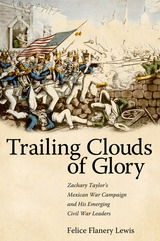
Trailing Clouds of Glory is the first examination of the roles played in the Mexican War by the large number of men who served with Taylor and who would be prominent in the next war, both as volunteer and regular army officers, and it provides fresh information, even on such subjects as Robert E. Lee and Ulysses S. Grant. Particularly interesting for the student of the Civil War are largely unknown aspects of the Mexican War service of Daniel Harvey Hill, Braxton Bragg, and Thomas W. Sherman.
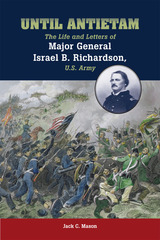
While researching this book, Jack C. Mason made the kind of discovery that historians dream of. He found more than one hundred unpublished and unknown letters from Union general Israel B. Richardson to his family, written from his time as a West Point cadet until the day before his fatal wounding at the Battle of Antietam, the bloodiest day in American history. Using these freshly uncovered primary sources as well as extensive research in secondary materials, Mason has written the first-ever biography of Israel Bush Richardson.
Mason traces Richardson’s growth as a soldier through his experiences and the guidance of his superiors, and then as a leader whose style reflected the actions of the former commanders he respected. Though he was a disciplinarian, Richardson took a relaxed attitude toward military rules, earning him the affection of his men. Unfortunately, his military career was cut short just as high-ranking officials began to recognize his aggressive leadership. He was mortally wounded while leading his men at Antietam and died on November 3, 1862.
Until Antietam brings to life a talented and fearless Civil War infantry leader. Richardson’s story, placed within the context of nineteenth-century warfare, exemplifies how one soldier’s life influenced his commanders, his men, and the army as a whole.
Winner of the Army Historical Foundation 2009 Distinguished Book Award
READERS
Browse our collection.
PUBLISHERS
See BiblioVault's publisher services.
STUDENT SERVICES
Files for college accessibility offices.
UChicago Accessibility Resources
home | accessibility | search | about | contact us
BiblioVault ® 2001 - 2024
The University of Chicago Press









